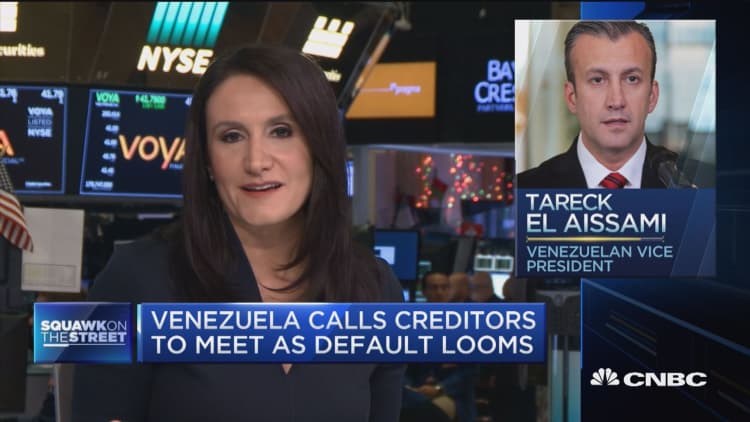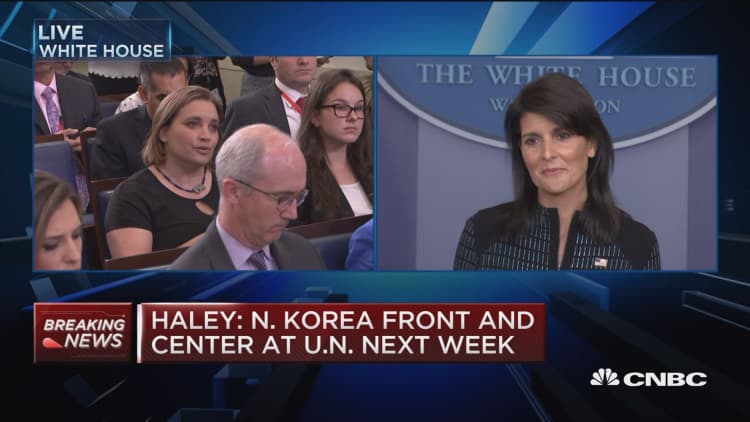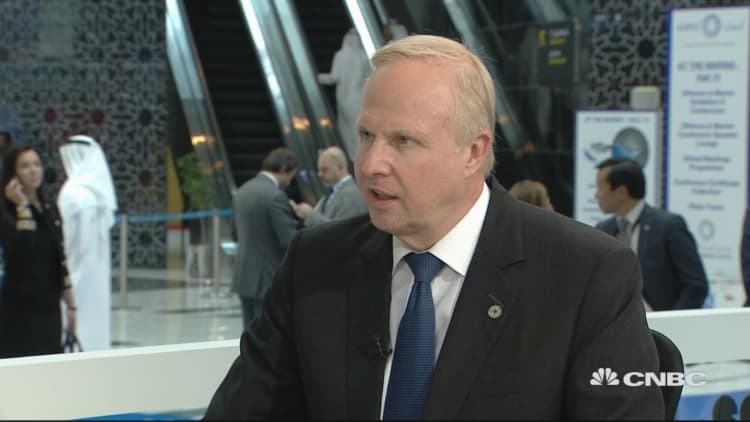Venezuela's socialist government gifted chocolates to creditors at debt talks on Monday, but little else in terms of firm proposals to renegotiate $60 billion in bonds, suggesting the struggling OPEC nation lacks a strategy to avert default.
President Nicolas Maduro confused investors this month with a vow to continue paying Venezuela's crippling debt, while also seeking to restructure and refinance it.
Both restructuring and refinancing appear out of the question, however, due to U.S. sanctions against the crisis-stricken nation. A default would compound Venezuela's dire economic crisis.
Monday's short and confused meeting, attended by senior Venezuelan officials blacklisted by the United States, gave no clarity on how Maduro would carry out his plan, bondholders and their representatives who participated said afterwards.
That means Venezuela remains with the dilemma of whether to continuing paying debt at the expense of an increasingly hungry and sick population, or defaulting on creditors and burning its bridges to the global financial system.

But bond prices maintained last week's rally, with one investor saying there was relief the meeting did not include a default announcement.
"There was no offer, no terms, no strategy, nothing," said one bondholder, leaving the meeting that lasted a little over half an hour at the 'White Palace', opposite Maduro's office in downtown Caracas.
"It was a missed opportunity," said another participant, also departing with a colorful gift-bag made out of recycled materials and containing Venezuelan chocolates and coffee.
The investors had entered via a red carpet and were greeted by a poster of Maduro's predecessor Hugo Chavez at the entrance of the meeting room inside, witnesses said.
About 100 investors, including some bondholders from New York, and lawyers representing creditors, had arrived.
Chief debt negotiators Vice President Tareck El Aissami and Economy Minister Simon Zerpa - on U.S. sanctions lists for drug and corruption charges respectively - attended for half an hour.
They met with some bondholders, while others stayed out of the room, witnesses said, as they were concerned about the consequences of meeting them. The U.S. has warned bondholders that they could face stiff penalties if they deal with sanctioned officials.

Participants said El Aissami gave a statement protesting unfair treatment by global financial institutions, including U.S. President Donald Trump's sanctions aimed at preventing Venezuela from issuing new debt.
El Aissami described U.S. financial authorities as "worse than the Holy Inquisition," one attendee said.
He also told creditors that Deutsche Bank may soon cut off some financial services to Venezuela, participants said.
Deutsche declined to comment.
Separately, the European Union approved economic sanctions and an arms embargo on Venezuela on Monday, although it has yet to name who will be subject to the sanctions.
Hunting food in garbage
Markets continue to remain optimistic that Venezuela will service its debts, noting it continues to make payments despite delays caused by increased bank vigilance.
It has made close to $2 billion in payments in the past two weeks, albeit delayed.
Bond prices were up across the board on Monday, with the benchmark 2022 notes issued by state oil firm PDVSA rising 3.25 percentage points.
But some investors fear Maduro's promise to restructure and refinance debt rings hollow, and that his government may in fact be paving the way for a default.
The economic implosion has already taken a brutal toll on Venezuelans. Citizens are increasingly suffering from malnutrition and preventable diseases because they cannot find food and medicine or cannot afford them because of triple-digit inflation.

The sight of poor Venezuelans eating from garbage bags has become a powerful symbol of decay. It contrasts sharply with the era of Chavez, when high oil prices helped fuel state spending.
Halting debt service would free up an additional $1.6 billion in hard currency by the end of the year. Those resources could be used to improve supplies of staple goods as Maduro heads into a presidential election expected for 2018.
But the strategy could backfire if met with aggressive lawsuits. A default by PDVSA, which issued about half of the country's outstanding bonds, could ensnare the company's foreign assets such as refineries in legal battles - potentially crimping export revenue.

